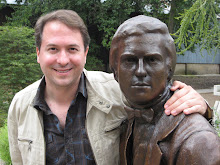Monday Morning, July 6th:

At the start of each morning session, a quote from Charles Darwin's writing was presented by actor Terry Malloy, who plays Darwin in the theatre production Re:Design (more on the later). It did a really great job of setting the mood for talking about Darwin's work.
The festival proper was started in great style by a series of talks on the Universal Impact of Darwin. Both the arts and sciences were represented by Dame Gillian Beer, an esteemed author and literary critic and Richard Dawkins, the author of the classic book The Selfish Gene and one of the 100 most influential people in the world according to Time Magazine. Since I’m finding I don’t have adequate time to do lots of writing AND enjoy a very packed festival, I am forced to simply briefly summarize each session and event, and will write up a more detailed description after I return home to Vancouver. (I'm typing away during the coffee break, which here in Cambridge England is of course "taking tea", of the afternoon session on day 2, there will be a bit of a time lag in my summaries)

Dame Beer very eloquently focused on Charles Darwin’s curiosity, powers of observation and use of language, particularly analogy and concluded that his “stretching of boundaries” was the source of his universal impact.

Prof. Dawkins described some of Darwin’s predecessors in thinking about evolution and natural selection and then went on to look at the modern era of “digital Darwinism”, which doesn’t have to do with computers, but rather the all or none digital aspect of genes. “An idea that would have seemed strange to Darwin, but I think he would have come to love it.”

(I was thrilled to get Dawkins to sign a copy of his Selfish Gene for me, the book that first got me interested in Evolutionary Biology!)
The panel presentations started with philosopher Elliot Sober commenting on the Metaphysical aspects of Darwin’s theory and if science has the power to postulate the existence of God. Historian Jonathan Hodge examined why Darwin took the route of a world-changing scientist rather than an unknown humble Parson Naturalist. Finally Ludmilla Jordanova talked about the impact of images of Darwin and how they effected public perceptions. The spirited question and answer session touched upon creationism, contemporary fiction, the importance of chance and Richard Dawkins’ croc-a-duck tie!
Coming up: an afternoon session on Speciation and then in the evening Swing Dancing!



No comments:
Post a Comment